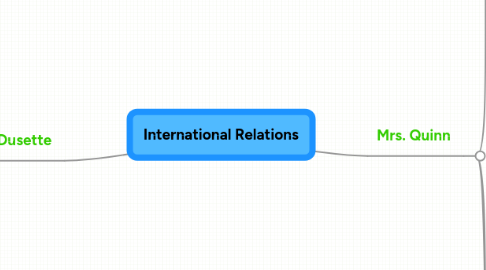
1. Miss. Dusette
1.1. Peacekeeping
1.1.1. General
1.1.1.1. UN peacekeepers are sent to various regions where armed conflict has recently ceased, or temporarily frozen, in order to enforce the terms of peace agreements and to discourage the combatants from resuming hostilities, for example in East Timor until its independence in 2001. These forces are provided by member states of the UN, and participation in peace keeping operations is optional; at this point only 2 nations, Canada and Portugal, have participated in all peacekeeping operations. The UN does not maintain any independent military. All UN peacekeeping operations must be approved by the Security Council.
1.1.2. Peacekeepers
1.1.2.1. Also Known as the "Blue Helmets"
1.1.2.2. Usually Military donated by voluntering countries.
2. Mrs. Quinn
2.1. The UN
2.1.1. General
2.1.1.1. Aims
2.1.1.1.1. The stated aims of the United Nations are to prevent war, to safeguard human rights, to provide a mechanism for international law, and to promote social and economic progress, improve living standards and fight diseases. It gives the opportunity for countries to balance global interdependence and national interests when addressing international problems. Toward these ends it ratified a Universal Declaration of Human Rights in 1948.
2.1.1.2. What is the UN?
2.1.1.2.1. The United Nations (UN) is an international organization whose stated aims are to facilitate co-operation in international law, international security, economic development, social progress and human rights issues.
2.1.1.3. Organizational structure of the UN
2.1.1.3.1. Security Council
2.1.1.3.2. General Assembly
2.1.1.3.3. ICJ (International Court of Justice)
2.1.1.3.4. Economic and Social Council
2.1.1.3.5. Secratariat
2.1.2. The Foundation of the UN
2.1.2.1. When?
2.1.2.1.1. 1945, Originally 50 countries signed the UN charter.
2.1.2.2. Why?
2.1.2.2.1. Successor to the League of Nations, founded to stop another WW.
2.1.2.3. Founding members
2.1.2.3.1. The Big Five (Holds Veto)
2.1.2.3.2. Plus 50 Member States.
2.1.3. Members
2.1.3.1. Current members
2.1.3.1.1. As of 2007 there are 192 member states that have signed the UN charter.
2.1.3.2. Rules for members
2.1.3.2.1. 1. Membership in the United Nations is open to all other peace-loving states which accept the obligations contained in the present Charter and, in the judgment of the Organization, are able and willing to carry out these obligations.
2.1.3.2.2. 2. The admission of any such state to membership in the United Nations will be effected by a decision of the General Assembly upon the recommendation of the Security Council.
2.2. War
2.2.1. What are the types of war?
2.2.1.1. Hegemonic War
2.2.1.1.1. War over control of the entire world order.
2.2.1.1.2. AKA world war, global war, general war or systemic war.
2.2.1.1.3. Last hegemonic war was WWII
2.2.1.2. Total War
2.2.1.2.1. Warfare by one state waged to conquer and occupy another
2.2.1.2.2. Goal to reach capital city and force surrender of the government
2.2.1.2.3. Entire society is mobilized for the struggle and the entire society is considered a regiment target
2.2.1.2.4. Eg: Iraqi war 2003
2.2.1.3. Limited War
2.2.1.3.1. Includes military actions carried out to gain some objective short of the surrender and occupation of the enemy.
2.2.1.3.2. Gulf war 1991 with America
2.2.1.4. Civil War
2.2.1.4.1. Refers to war between factions within a state trying to create,or prevent, a new government for the entire state or some territorial part of it.
2.2.1.5. Guerrilla War
2.2.1.5.1. Includes certain kinds of civil wars, is warfare without front lines.
2.2.1.5.2. Irregular forces operate in the midsts of, and often hidden or protected by civillian populations.
2.2.1.5.3. Idea is to harass and punish the enemy so as to limit its effectiveness.
2.2.2. What is war?
2.2.2.1. Sustained intergroup violence (deliberately inflicting death and injury) in which state military forces participate on at least one side.
2.2.3. General Statements
2.2.3.1. 1.) Virtually all societies experience war and/or intergroup violence.
2.2.3.2. 2.) Democratic states almost never fight wars against other democracies.
2.3. Terrorism
2.3.1. Definition
